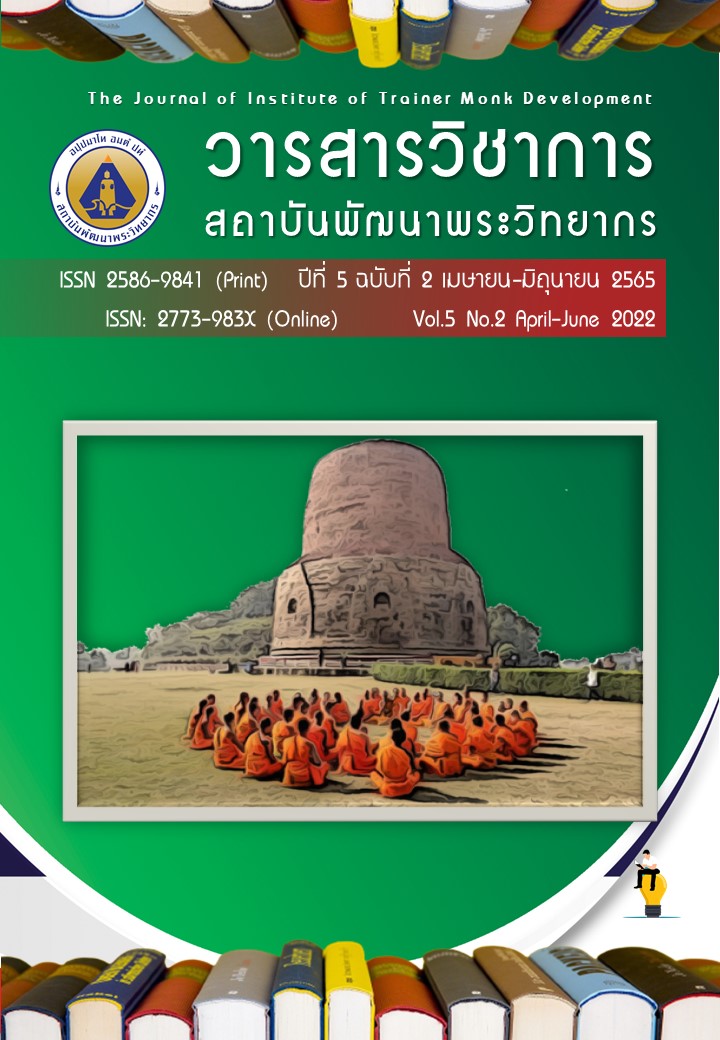Elementary School Administration Model according to the concept of Royal Award Buddhist Oriented Schools
Main Article Content
Abstract
This Article aimed to study 1) to study the components of the Elementary school administration model according to the concept of royal award-oriented schools, 2) to create an elementary school administration model according to the concept of royal award-oriented schools, and 3) to evaluate and affirm the elementary school administration model according to the concept of royal award-oriented schools. The mixed research methodology was used in the study. The data were collected by questionnaires with reliability at 0.92, structural interviews and checklist forms from 448 samples consisting of school directors, heads of department, board of basic Education schools and the teachers responsible for the project in 56 royal award Buddhist oriented schools. The data were collected from January 2021 to February 202and then analyzed by frequency, percentage, mean, standard deviation, exploratory factor analysis.
- The components of the Elementary School Administration model according to the concept of royal award-oriented schools consist of 5 components and 66 variables.
- The elementary school administration model according to the concept of royal award-oriented schools from exploratory factor analysis (EFA) has 5 main components; 1) School Administration, 2) School Activities, 3) Tri-Sikkha, 4) School Atmosphere, and 5) Behavior of School Administrators.
- The evaluation and confirmation of the model from experts in its were at 100 % verification of acceptable range of accuracy, suitability, possibility, and practicality.
Article Details

This work is licensed under a Creative Commons Attribution-NonCommercial-NoDerivatives 4.0 International License.
บทความที่ได้รับการตีพิมพ์เป็นลิขสิทธิ์ของวารสารวิชาการสถาบันพัฒนาพระวิทยากร
ข้อความที่ปรากฎอยู่ในบทความที่ได้รับการตีพิมพ์ในวารสาร ถือเป็นความรับผิดชอบของผู้เขียนบทความ และข้อคิดเห็นนั้นไม่ถือว่าเป็นทัศนะและความรับผิดชอบของกองบรรณาธิการวารสารวิชาการสถาบันพัฒนาพระวิทยากร
References
กระทรวงศึกษาธิการ. (2546). พระราชบัญญัติการศึกษาแห่งชาติ พ.ศ. 2542 และแก้ไขเพิ่มเติม (ฉบับที่ 2/2545). กรุงเทพฯ: โรงพิมพ์องค์การรับส่งสินค้าและพัสดุภัณฑ์.
ธนสาร บัลลังก์ปัทมา. (2563). รูปแบบการบริหารโรงเรียนคุณธรรมของผู้บริหารสถานศึกษา สังกัดสำนักงานเขตพื้นที่การศึกษาประถมศึกษา. ดุษฎีนิพนธ์ปริญญาพุทธศาสตรดุษฎีบัณฑิต, สาขาวิชาการบริหารการศึกษา บัณฑิตวิทยาลัย, มหาวิทยาลัยมหากกุฎราชวิทยาลัย.
ประภาพร จันทรัศมี. (2559). การบริหารโรงเรียนเพื่อเสริมสร้างความเข้มแข็งทางคุณธรรมจริยธรรมของนักเรียนประถมศึกษา. วิทยานิพนธ์ครุศาสตรดุษฎีบัณฑิต สาขาวิชาบริหารการศึกษา คณะครุศาสตร์, จุฬาลงกรณ์มหาวิทยาลัย.
พระครูปลัดอเนก ปุณฺณวุฑฺโฒ (แก้วดวงดี). (2561). รูปแบบการบริหารตามหลักไตรสิกขาของผู้บริหารโรงเรียน สังกัดสำนักงานเขตพื้นที่การศึกษามัธยมศึกษา เขต 5. ดุษฎีนิพนธ์ปริญญาพุทธศาสตรดุษฎีบัณฑิต สาขาวิชาพุทธบริหารการศึกษา บัณฑิตวิทยาลัย, มหาวิทยาลัยจุฬาลงกรณราชวิทยาลัย.
พระมหาวิชาญ สุวิชาโน (บัวบาน) และ เกษม แสงนนท์. (2562). คู่มือดำเนินงานโรงเรียนวิถีพุทธ. พระนครศรีอยุธยา: มหาวิทยาลัยมหาจุฬาลงกรณราชวิทยาลัย.
วิทยา ประวะโข. (2560). การสร้างกระบวนการเรียนรู้ตามหลักไตรสิกขาเพื่อพัฒนานักเรียนในโรงเรียนวิถีพุทธ สังกัดสำนักงานเขตพื้นที่การศึกษาประถมศึกษาอุดรธานี เขต 1. วิทยานิพนธ์ปริญญาดุษฎีบัณฑิต สาขาวิชาพุทธศาสนา บัณฑิตวิทยาลัย, มหาวิทยาลัยจุฬาลงกรณราชวิทยาลัย.
สำนักงานคณะกรรมการสถานศึกษาขั้นพื้นฐาน. (2550). แนวทางการกระจายอำนาจการบริหารและการบริหารจัดการศึกษาให้คณะกรรมการสำนักงานเขตพื้นที่การศึกษาและสถานศึกษาตามกฎกระทรวงกำหนดหลักเกณฑ์และวิธีการกระจายอำนาจการบริหารและการจัดการศึกษา พ.ศ. 2550. กรุงเทพฯ: โรงพิมพ์ชุมนุมสหกรณ์การเกษตรแห่งประเทศไทย จำกัด
มหาวิทยาลัยมหาจุฬาลงกรณราชวิทยาลัย. (2553). ผลการดำเนินการ 29 ประการสู่ความเป็นโรงเรียนวิถีพุทธ ตามแบบ กพร.ข้อที่ 15. สืบค้นเมื่อ 24 เมษายน 2564, https://www.vitheebuddha.com/main.php?url=about&id=35
Cranley, Mary Elizbeth, (2003). Tessaban School: The Moral life of a Thai Primary School, Dissertation Abstracts International.
Pitt Community College. (2011). Planning-Implementation-Evaluation Cycle (PIE Cycle). [Online]. Rtrieved May 5, 2013, from: http://www.pitcc.edu/experience-pcc/planning-and-research/planning-and-institutional-effectiverness/PIE-Inst_WorkunitCycle.pdf.


